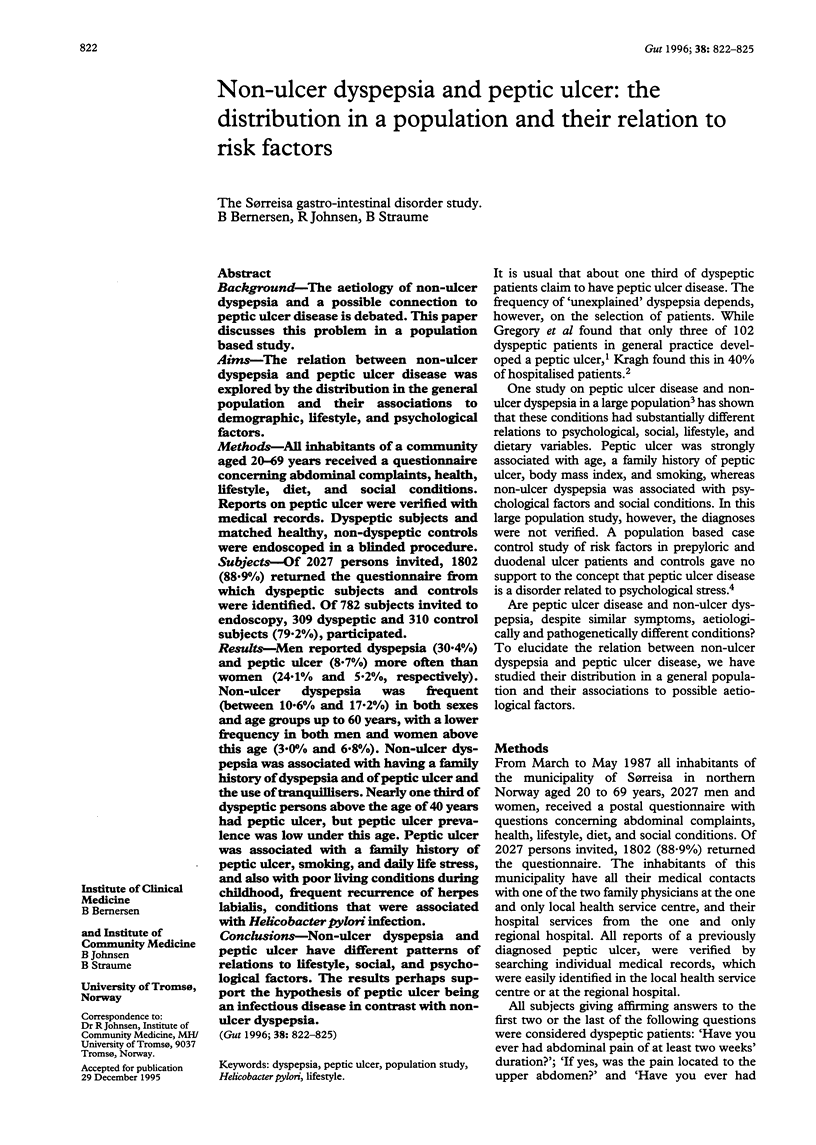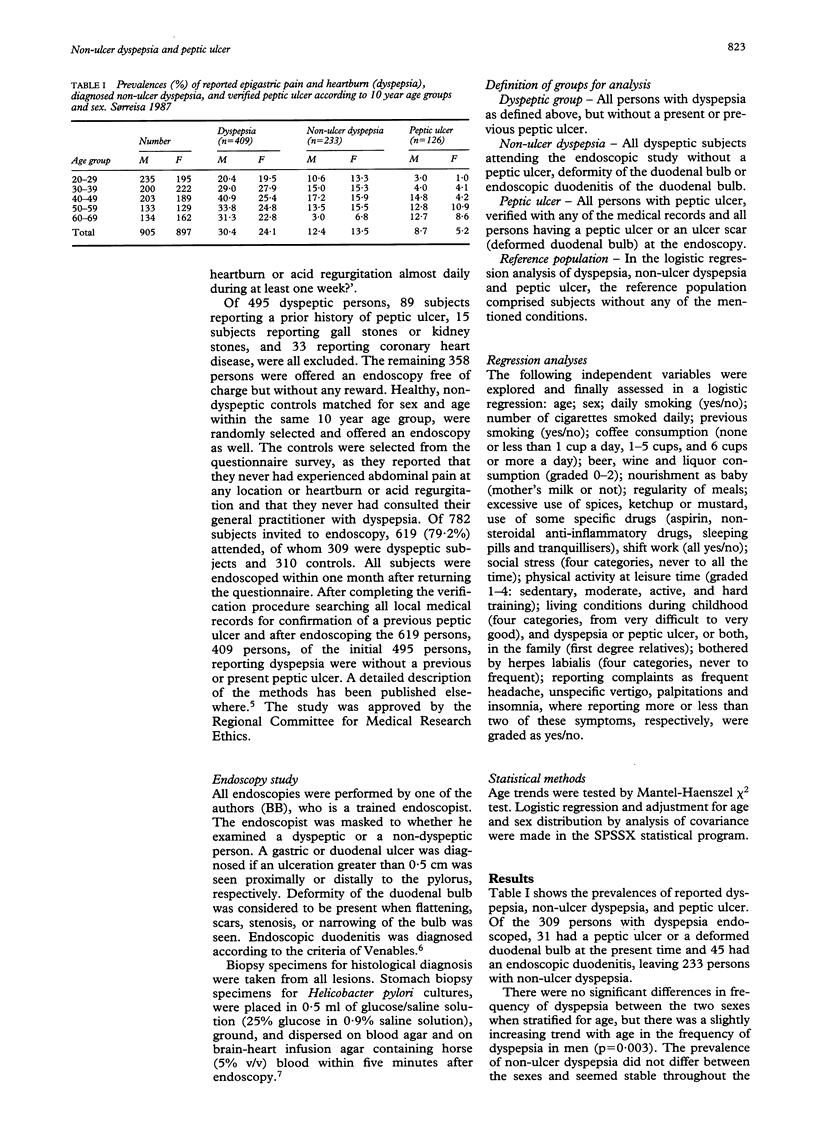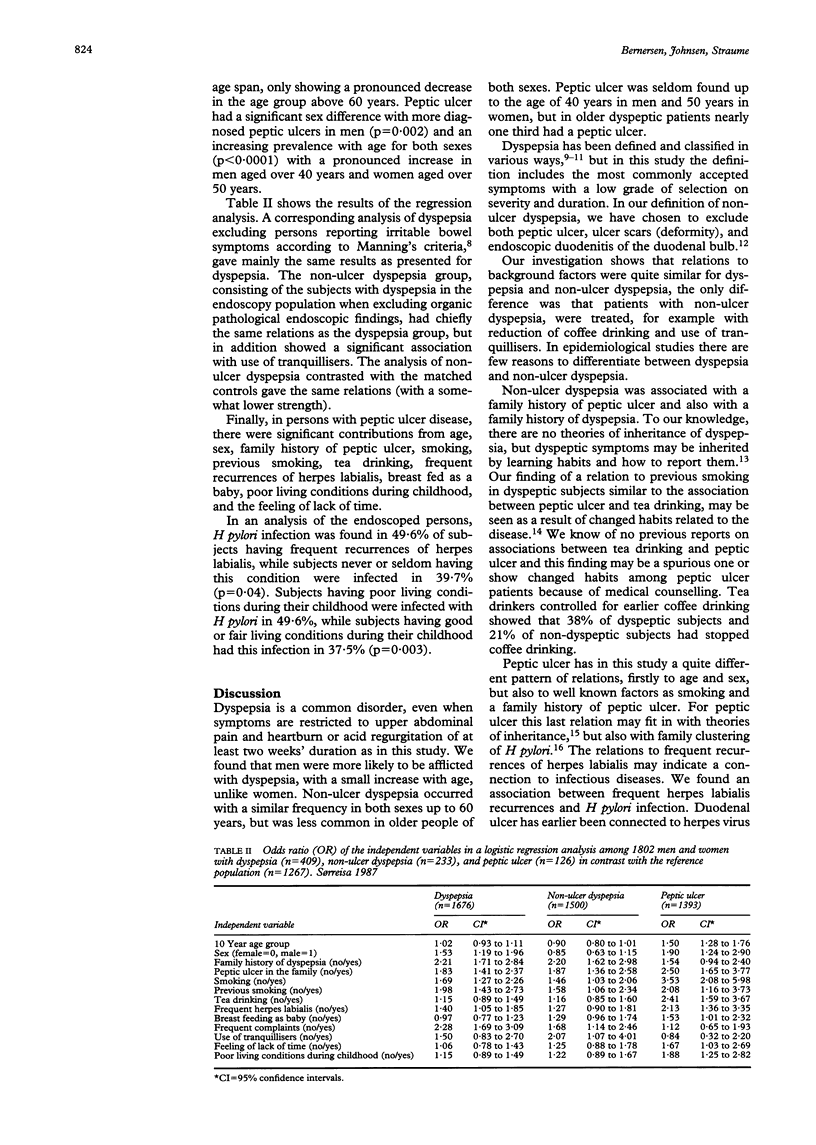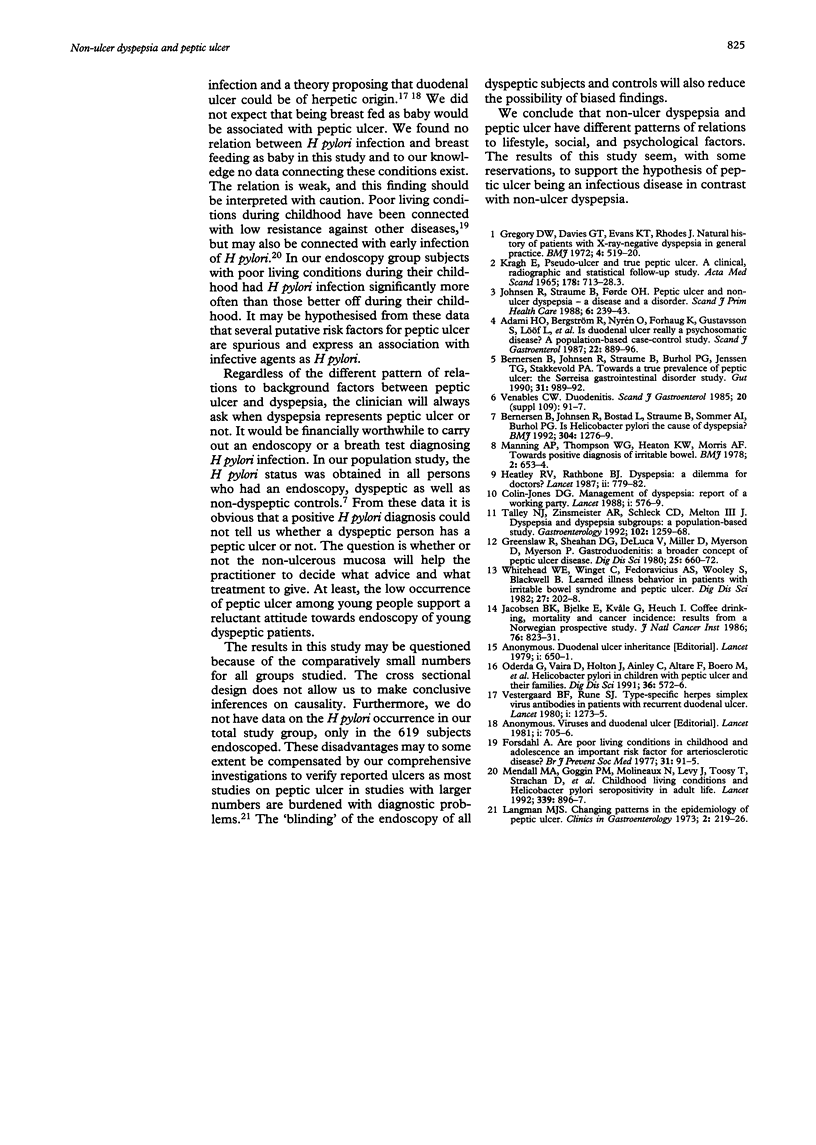Abstract
BACKGROUND: The aetiology of non-ulcer dyspepsia and a possible connection to peptic ulcer disease is debated. This paper discusses this problem in a population based study. AIMS: The relation between non-ulcer dyspepsia and peptic ulcer disease was explored by the distribution in the general population and their associations to demographic, lifestyle, and psychological factors. METHODS: All inhabitants of a community aged 20-69 years received a questionnaire concerning abdominal complaints, health, lifestyle, diet, and social conditions. Reports on peptic ulcer were verified with medical records. Dyspeptic subjects and matched healthy, non-dyspeptic controls were endoscoped in a blinded procedure. SUBJECTS: Of 2027 persons invited, 1802 (88.9%) returned the questionnaire from which dyspeptic subjects and controls were identified. Of 782 subjects invited to endoscopy, 309 dyspeptic and 310 control subjects (79.2%), participated. RESULTS: Men reported dyspepsia (30.4%) and peptic ulcer (8.7%) more often than women (24.1% and 5.2%, respectively). Non-ulcer dyspepsia was frequent (between 10.6% and 17.2%) in both sexes and age groups up to 60 years, with a lower frequency in both men and women above this age (3.0% and 6.8%). Non-ulcer dyspepsia was associated with having a family history of dyspepsia and of peptic ulcer and the use of tranquillisers. Nearly one third of dyspeptic persons above the age of 40 years had peptic ulcer, but peptic ulcer prevalence was low under this age. Peptic ulcer was associated with a family history of peptic ulcer, smoking, and daily life stress, and also with poor living conditions during childhood, frequent recurrence of herpes labialis, conditions that were associated with Helicobacter pylori infection. CONCLUSIONS: Non-ulcer dyspepsia and peptic ulcer have different patterns of relations to lifestyle, social, and psychological factors. The results perhaps support the hypothesis of peptic ulcer being an infectious disease in contrast with non-ulcer dyspepsia.
Full text
PDF



Selected References
These references are in PubMed. This may not be the complete list of references from this article.
- Adami H. O., Bergström R., Nyrén O., Forhaug K., Gustavsson S., Löf L., Nyberg A. Is duodenal ulcer really a psychosomatic disease? A population-based case-control study. Scand J Gastroenterol. 1987 Sep;22(7):889–896. doi: 10.3109/00365528708991931. [DOI] [PubMed] [Google Scholar]
- Bernersen B., Johnsen R., Bostad L., Straume B., Sommer A. I., Burhol P. G. Is Helicobacter pylori the cause of dyspepsia? BMJ. 1992 May 16;304(6837):1276–1279. doi: 10.1136/bmj.304.6837.1276. [DOI] [PMC free article] [PubMed] [Google Scholar]
- Bernersen B., Johnsen R., Straume B., Burhol P. G., Jenssen T. G., Stakkevold P. A. Towards a true prevalence of peptic ulcer: the Sørreisa gastrointestinal disorder study. Gut. 1990 Sep;31(9):989–992. doi: 10.1136/gut.31.9.989. [DOI] [PMC free article] [PubMed] [Google Scholar]
- Forsdahl A. Are poor living conditions in childhood and adolescence an important risk factor for arteriosclerotic heart disease? Br J Prev Soc Med. 1977 Jun;31(2):91–95. doi: 10.1136/jech.31.2.91. [DOI] [PMC free article] [PubMed] [Google Scholar]
- Greenlaw R., Sheahan D. G., DeLuca V., Miller D., Myerson D., Myerson P. Gastroduodenitis. A broader concept of peptic ulcer disease. Dig Dis Sci. 1980 Sep;25(9):660–672. doi: 10.1007/BF01308325. [DOI] [PubMed] [Google Scholar]
- Gregory D. W., Davies G. T., Evans K. T., Rhodes J. Natural history of patients with x-ray-negative dyspepsia in general practice. Br Med J. 1972 Dec 2;4(5839):519–520. doi: 10.1136/bmj.4.5839.519. [DOI] [PMC free article] [PubMed] [Google Scholar]
- Heatley R. V., Rathbone B. J. Dyspepsia: a dilemma for doctors? Lancet. 1987 Oct 3;2(8562):779–782. doi: 10.1016/s0140-6736(87)92509-8. [DOI] [PubMed] [Google Scholar]
- Jacobsen B. K., Bjelke E., Kvåle G., Heuch I. Coffee drinking, mortality, and cancer incidence: results from a Norwegian prospective study. J Natl Cancer Inst. 1986 May;76(5):823–831. [PubMed] [Google Scholar]
- Johnsen R., Straume B., Førde O. H. Peptic ulcer and non-ulcer dyspepsia--a disease and a disorder. Scand J Prim Health Care. 1988 Nov;6(4):239–243. doi: 10.3109/02813438809009324. [DOI] [PubMed] [Google Scholar]
- Management of dyspepsia: report of a working party. Lancet. 1988 Mar 12;1(8585):576–579. [PubMed] [Google Scholar]
- Manning A. P., Thompson W. G., Heaton K. W., Morris A. F. Towards positive diagnosis of the irritable bowel. Br Med J. 1978 Sep 2;2(6138):653–654. doi: 10.1136/bmj.2.6138.653. [DOI] [PMC free article] [PubMed] [Google Scholar]
- Mendall M. A., Goggin P. M., Molineaux N., Levy J., Toosy T., Strachan D., Northfield T. C. Childhood living conditions and Helicobacter pylori seropositivity in adult life. Lancet. 1992 Apr 11;339(8798):896–897. doi: 10.1016/0140-6736(92)90931-r. [DOI] [PubMed] [Google Scholar]
- Oderda G., Vaira D., Holton J., Ainley C., Altare F., Boero M., Smith A., Ansaldi N. Helicobacter pylori in children with peptic ulcer and their families. Dig Dis Sci. 1991 May;36(5):572–576. doi: 10.1007/BF01297021. [DOI] [PubMed] [Google Scholar]
- Talley N. J., Zinsmeister A. R., Schleck C. D., Melton L. J., 3rd Dyspepsia and dyspepsia subgroups: a population-based study. Gastroenterology. 1992 Apr;102(4 Pt 1):1259–1268. [PubMed] [Google Scholar]
- Venables C. W. Duodenitis. Scand J Gastroenterol Suppl. 1985;109:91–101. doi: 10.3109/00365528509103941. [DOI] [PubMed] [Google Scholar]
- Vestergaard B. F., Rune S. J. Type-specific herpes-simplex-virus antibodies in patients with recurrent duodenal ulcer. Lancet. 1980 Jun 14;1(8181):1273–1274. doi: 10.1016/s0140-6736(80)91733-x. [DOI] [PubMed] [Google Scholar]
- Whitehead W. E., Winget C., Fedoravicius A. S., Wooley S., Blackwell B. Learned illness behavior in patients with irritable bowel syndrome and peptic ulcer. Dig Dis Sci. 1982 Mar;27(3):202–208. doi: 10.1007/BF01296915. [DOI] [PubMed] [Google Scholar]


